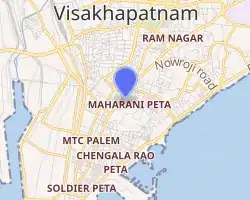Choultry is commonly referred to as a resting place, a roadway inn for travelers, on a pilgrimage to a site, linked to Buddhist, Jain and Hindu temples or traders. Also known as chowry, chawari, it is widely called Chatram or chawadi in central and south Tamil nadu popularized by the Maratha rulers of Thanjavur. In North India similar facilities are called Dharmshalas. This concept has been around for several centuries to help the travellers from one place to another. Services may be free or for a nominal fee at a choultry and they may include seating space, rooms, water and sometimes food financed by a local ruler of a rich man.
.jpg) |
| Facade arched portion Turner's choultry, vizag, AP yovizag.com |
 |
| Turner's choultry, vizag, AP yovizag.com |
Located in Jagadamba Centre, Visakhapatnam in 1893 the work on the Choultry began and the construction cost was Rs. 43000, out of which Rs 10000 was paid each by the Maharajah of Vizianagram, Pusapati Ananda Gajapati Raju, and King Goday Narayana Gajapathi respectively. It was to provide temporary shelters to the traders, pilgrims and others.
 |
| location map Turner's choultry. iab.me |
In the wake of introduction of the railroad and construction of a civil dispensary and hospital, the coastal town of Visakhapatnam saw a sudden spurt in growth and lots of visitors daily started visiting the town to board the train or to visit the newly built hospital. So. to meet the needs of the people from nearby villages, the Rajah of Bobbili, being charitable, had a choultry with basic amenities built as a memorial to the District Collector HG (Henry Gribble) Turner_1843-1920 . former district collector of Vizagapatam. It was named Turner’s Choultry or ‘Turner Chatram/Satram’ in Telugu –
 |
| Turner's choultry, vizag, AP researchgate.net |
Above image: Built in the year 1898 (work began in 1893), initially it was a travellers' choultry; later was named as the Turner's Choultry. This is a fine example of to build the walls using dressed stones. Length of the building 90 feet; width 60 feet wide. Single story structure with slanting tiled roof with an open courtyard in the middle for light and ventilation. In the facade it is accessible through a flight of steps with a pointed arched entrance with side slanting roof.....................
The kind hearted Raja's intention was to provide affordable stay for the people, who would visit KGH for medical purposes, Many philanthropists helped build a choultry – a lodging facility – in the later part of the 19th century. Maharajah Gode Narayana Gajapathi Row of “Chemudu” region, who donated about thirteen thousand square yards in the area . The site where the choultry stands now was then known as ‘Enugula Thota’ (meaning “Elephant Lines”) of 104 Madras Regiment of the EIC. The remnants are there in the forms of big stones to which the elephants were tied. Close to the choultry there is a huge water tank and next to the police barracks the elephants were taken to be bathed.
https://iiab.m/kiwix/wikipedia_en_all_maxi_2022-05/A/Turner's_Choultry
https://www.yovizag.com/vizag-famous-heritage-buildings/#google_vignette









